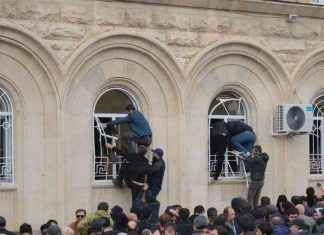A far-reaching question is currently heating up spirits in Brussels, but also in the European capitals: Should Russians no longer be allowed to enter the EU because of the war of aggression against Ukraine – and should there be a visa freeze? Until now, Russian citizens could move within six months in the border-free Schengen area with a visa for up to 90 days.
“It is not right that Russians can live normal lives, travel in Europe and be tourists while Russia is waging a brutal war of aggression in Europe,” said Finnish Prime Minister Sanna Marin. “Visiting Europe is a privilege, not a human right,” said Estonian Prime Minister Kaja Kallas. Because the three Baltic states, but also Poland, Denmark and the Czech Republic want to enforce a ban. Belgium and the Netherlands have also stopped accepting Russian visa applications for a long time.
On the other side is EU chief diplomat Josep Borrell. That was “not a good suggestion,” he said on Sunday evening. Contact with Russian civil society should not be cut off. “In any case, I’m not in favor of no longer issuing visas at all,” he said. The Spaniard will also chair the informal meeting of EU foreign ministers in Prague on Tuesday. Then it comes to the showdown. It might get hot. Greece, Cyprus, Spain, Portugal, Italy and France are also opposed – the countries fear losing Russian tourists.
Chancellor Olaf Scholz also rejects a general ban on tourist visas for Russians. “This is Putin’s war, and that’s why I have a hard time with this idea,” he said in mid-August. Austria shares this point of view: “We must not throw the baby out with the bath water, a blanket ban on visas for Russian nationals would completely cut off the last contacts with Russian civil society,” said Foreign Minister Alexander Schallenberg to WELT.
“It’s bad if you no longer have the freedom to travel,” says WELT correspondent Christoph Wanner. He explains why he still doesn’t believe in the effect of a visa restriction – and why it is impossible for the Russians to “freeze the war”.
Source: WELT/ Alexander Siemon
It would be “nonsensical” to block the way to the West for critical voices in Russia right now. Schallenberg continued: “The Kremlin’s news embargo is obscuring the Russian population’s view of Putin’s actions in Ukraine. A visa freeze would also be counterproductive in the fight against the Russian propaganda machine.”
If the EU were to block the Russian population’s door to Europe across the board, the minister continued, it would “only fuel the camp mentality propagated by the Kremlin.” Schallenberg also pointed out that the EU already had “the most massive sanctions in European history”. would have paved the way.
Several EU countries have already stopped issuing visas to Russians. But that’s no use as long as Russian tourists continue to fly to Germany via Serbia or Turkey, for example, and can thus enter the EU with a Schengen visa in order to move from there to Poland, for example, where visas are no longer issued to them. That is why the advocates of a ban are pushing for a European solution that does not allow any loopholes.
In 2019 alone, 4.1 million Russians applied for a visa, and it was approved in 98.5 percent of all cases. However, the numbers have been falling since the outbreak of war on February 24, also because there is no longer any direct air traffic between the EU and Russia. Since the beginning of the war, around 14,000 Russian citizens have received Schengen visas from Germany.
Bad, because such a ban violates the principle of equality and the ban on discrimination, according to EU Commission circles. Reason: The Schengen Borders Code stipulates that each visa application must be checked individually.
Article 32 lists specific reasons that allow the application to be rejected: danger to public order, internal security or public health. You can also appeal against the rejection of an application. A visa stop for Russians could therefore only be enforced by changing the Schengen border code or by including it in a new sanctions package. However, neither would be politically enforceable.
Usually yes. A visa freeze would be a big problem for opponents of the regime. Many activists, researchers and opposition politicians depend on the possibility of leaving Russia unplanned. A regular Schengen visa allows them a short-term stay in Europe, where they can then plan their next steps: further education with a student visa, looking for work or applying for asylum in the EU. They can leave without their goals being transparent to the Russian state and without becoming a pretext for further repression.
The alternative to this is a legally uncertain stay in countries such as Armenia or Georgia, which Russian citizens can travel to without a visa – but where they are not granted asylum. The issuance of European humanitarian visas for people at risk often requires months of waiting and is associated with high hurdles.
According to the Stiftung Wissenschaft und Politik, Germany has issued a few hundred humanitarian visas to Russian citizens since the outbreak of war. Staying in a supposedly “safe third country” like Georgia can already be sufficient reason for rejection.
The thesis of the connection between the visa freeze and approval for war is highly speculative. Only a minority of Russians, between 30 and 35 percent depending on the source, even have a passport that would allow them to travel to the EU with a visa.
Traveling to the EU is currently associated with high costs and immense logistical difficulties – air traffic is suspended, Russian credit cards do not work in the EU. In any case, the EU is not the ultimate tourist destination for most Russians. The top destination in 2021 was the breakaway Georgian Republic of Abkhazia, which recognizes Russia as an independent state (5.2 million travelers), followed by Turkey (4.9 million).








